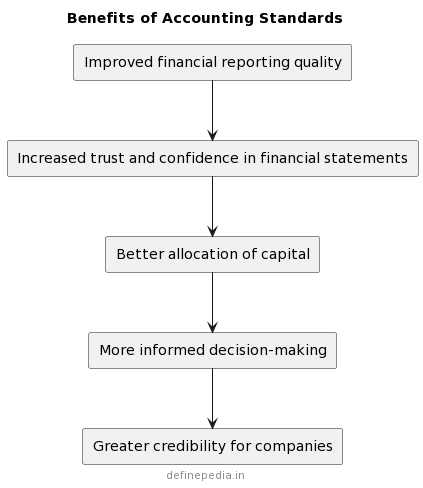Definition
Institute of Chartered Accountants of India (ICAI) “Accounting Standards mainly deal with four major issues of accounting, namely. Recognition of financial events. Measurement of financial transactions. Presentation of financial statements in a fair manner.”
Accounting standards are classic standards for financial reporting and are the primary source of GAAP.
- The primary objectives of Accounting Standards are to improve the reliability, comparability, and transparency of financial statements
- They also aim to prevent fraud and accounting manipulations
Financial statements can tell a lot about a company’s revenue, expenses, profitability, liability, and ability to satisfy short-term and long-term financial responsibilities.
So financial statement information is used by investors. And analysts to make choices regarding a company’s valuation and credit worthiness.
Company managers, investors, analysts, lenders, and other stakeholders use financial statements to make informed decisions.
Basically, it provides a consistent framework for financial reporting, and maintains financial statement consistency and comparability. And improves transparency and accountability.
IFRS provides a uniform framework for financial reporting. So basically it implies that businesses must compile their financial statements in accordance with a set of principles and criteria.
It is published consistently and reliably. So that makes it easier for stakeholders to compare financial data across businesses.
So basically this information is used by stakeholders. Such as investors and creditors, to make informed/right decisions about their investments.
By requiring organizations to follow an established set of principles. So it helps to foster trust and confidence in financial reporting, which improves openness and accountability.
Benefits of Accounting Standard
Accounting standards provide consistency and fair estimates. And valuations, accurate reporting, independence, and appropriate consideration. They improve the transparency of financial reporting in all countries. And increase the credibility and reliability of financial statements.
AS can lead to improved financial reporting quality, and increased trust and confidence in financial statements. So for better allocation of capital, more informed decision-making. Greater credibility and reliability of financial statements, managerial accountability, and lower cost of capital for some companies. And increased investment in jurisdictions adopting IFRS Accounting Standards.
The improved quality of financial reporting
One of the primary benefits of accounting standards is the improved quality of financial reporting. By establishing uniform reporting requirements and guidelines. So accounting standards help companies produce more accurate and reliable financial statements. This, is turn, enhances transparency, reduces the risk of errors and fraud. And provides stakeholders with greater confidence in the financial information presented.
Improving financial reporting
It helps improve financial reporting quality, accounting standards also promote better capital allocation. Investors rely on accurate financial information to evaluate a company’s performance and make investment decisions. Investors can evaluate the financial performance of different companies. And make the right judgments about where to put their capital provided reporting standards are uniform.
Informed decision-making
It facilitates more informed decision-making by providing relevant and reliable financial information to stakeholders. By presenting financial information in a clear and standardized format. So accounting standards make it easier for stakeholders to check a company’s financial health and identify potential risks and opportunities.
The credibility of companies
Finally, accounting standards help enhance the credibility of companies. By attaching to accounting standards, companies demonstrate their commitment to transparency and ethical business practices. It can improve their reputation and build trust with stakeholders.
Limitations of Accounting Standards with Potential Impact
Manipulation or Misinterpretation
One of the most significant limitations of accounting standards is the potential for manipulation or misinterpretation. Because accounting standards can be flexible and open to interpretation. It can be challenging to detect when a company is fudging its numbers. This can lead to inaccurate financial statements and reports that misrepresent a company’s financial health and performance.
Difficulty in applying
Another limitation of accounting standards is the difficulty in applying standards to certain industries or transactions. Some industries or transactions may require specialized accounting treatments that are not covered by general accounting standards. So this can lead to confusion and inconsistency in financial reporting across different industries.
Complexity and Cost of Implementation
The complexity and cost of implementation are also significant limitations of accounting standards. Compliance with accounting standards can be time-consuming and expensive. Especially for small businesses with limited resources. This can make it challenging for businesses to comply with accounting standards. And can impact their ability to compete in the market.
Lack in flexibility
Finally, accounting standards lack in flexibility in responding to changing business environments. This can be especially problematic for businesses operating in rapidly evolving industries or markets. AS may not reflect the latest trends or developments, making it difficult for businesses to accurately report their financial performance.
Despite these limitations, accounting standards such as GAAP play a crucial role in helping businesses report their financial performance accurately and transparently. By understanding these limitations and their potential impact, businesses can take steps to mitigate their impact. And ensure the accuracy and usefulness of their financial statements.
Was this helpful?
0 / 0
